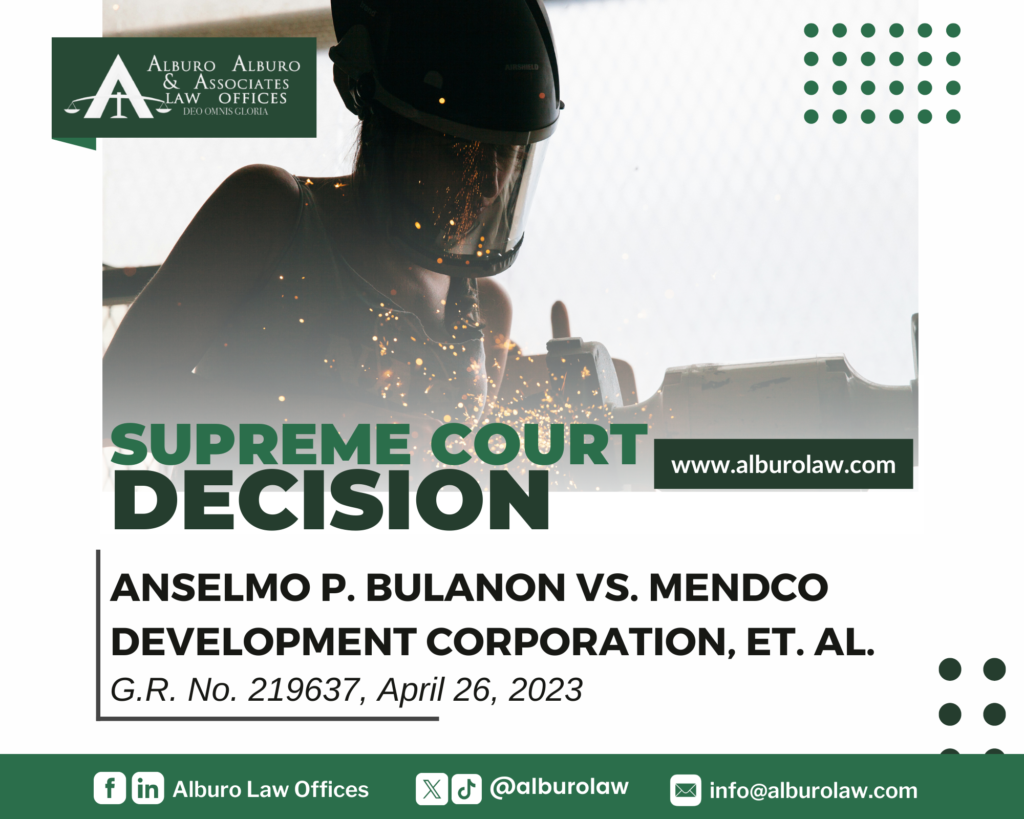
Photo from Unsplash | Chris Ralston
The following post does not create a lawyer-client relationship between Alburo Alburo and Associates Law Offices (or any of its lawyers) and the reader. It is still best for you to engage the services of a lawyer or you may directly contact and consult Alburo Alburo and Associates Law Offices to address your specific legal concerns, if there is any.
Also, the matters contained in the following were written in accordance with the law, rules, and jurisprudence prevailing at the time of writing and posting, and do not include any future developments on the subject matter under discussion.
AT A GLANCE:
In evaluating whether such a relationship exists, the Court of Appeals (CA) applied a four-fold test:
- Selection and Engagement: The process by which the employee was hired.
- Payment of Wages: How the employee was compensated.
- Power to Discipline and Dismiss: The employer’s authority over the employee.
- Control: The employer’s ability to dictate the means and methods of the employee’s work.
Anselmo Bulanon alleged he was hired as a Welder/Fabricator by Eric Ng Mendoza, who owned several furniture businesses including Mendco Development Corporation, Pinnacle Casting Corporation, Mastercraft Phil., Inc., and Jacquer International. On January 6, 2006, Bulanon filed a complaint with the Department of Labor and Employment (DOLE) against Eric and his companies for various unpaid benefits and lack of social security coverage.
DOLE’s inspection confirmed the non-payment of some benefits, and Bulanon was subsequently instructed not to return to work. When he attempted to return on January 16, 2006, he was barred from the premises. Bulanon then filed complaints with the National Labor Relations Commission (NLRC) for illegal suspension and dismissal, seeking back wages, separation pay, and damages.
Eric and the companies denied the allegations, asserting Bulanon was not their employee but rather engaged in various tasks on an irregular basis.
The Labor Arbiter initially ruled that Bulanon was illegally dismissed. However, the NLRC reversed this decision, finding no employer-employee relationship and classifying Bulanon as a freelance worker rather than an employee.
The Court of Appeals (CA) upheld the NLRC’s decision, dismissing Bulanon’s petition and agreeing that he was an independent contractor rather than an employee. Bulanon contends that the CA erred by not recognizing the employer-employee relationship, arguing that his submitted Daily Time Records and Affidavit provided sufficient evidence to prove his employment status. He has now brought the case before the Supreme Court through a Petition for Review on Certiorari.
In this case, the Court held that in an illegal dismissal case, the burden of proof lies with the employer to demonstrate that the dismissal was valid. However, before such a case can proceed, the existence of an employer-employee relationship must be established.
In evaluating whether such a relationship exists, the Court of Appeals (CA) applied a four-fold test:
- Selection and Engagement: The process by which the employee was hired.
- Payment of Wages: How the employee was compensated.
- Power to Discipline and Dismiss: The employer’s authority over the employee.
- Control: The employer’s ability to dictate the means and methods of the employee’s work.
In this case, the CA found no employer-employee relationship between Anselmo Bulanon and the respondents based on these criteria. Key points include:
- Evidence of Employment: Bulanon’s Daily Time Records (DTRs) were deemed unreliable due to their questionable authenticity and lack of proper certification. They were also inconsistent with the typical documentation for regular employees.
- Scope of Work: The nature of Bulanon’s work—performing various tasks on a project basis—suggested he was a handyman hired intermittently rather than a regular employee.
- Payment of Wages: Bulanon was paid by Eric’s personal assistant, not through a company’s accounting department, which further indicated a non-employee status.
- Control: Bulanon’s work did not demonstrate the control an employer typically exercises over an employee’s daily tasks and schedules.
The CA concluded that Bulanon failed to provide substantial evidence to prove an employer-employee relationship with Eric and his associated companies. Consequently, Bulanon’s claims of illegal dismissal could not be sustained.
Source:
Anselmo P. Bulanon vs. Mendco Development Corporation, et. al., G.R. No. 219637, April 26, 2023
Alburo Alburo and Associates Law Offices specializes in business law and labor law consulting. For inquiries regarding taxation and taxpayer’s remedies, you may reach us at info@alburolaw.com, or dial us at (02)7745-4391/0917-5772207.
All rights reserved.


